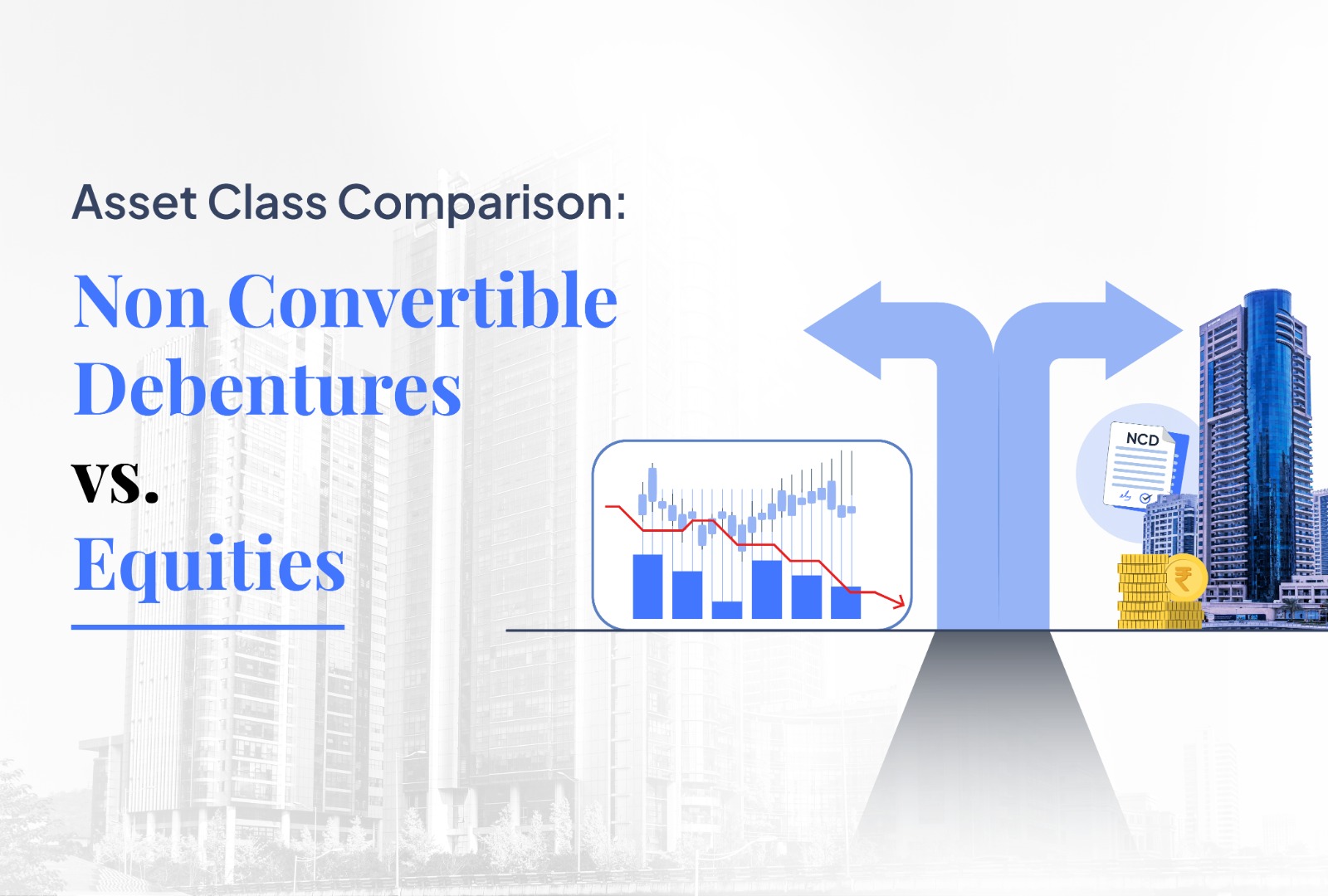Investors interested in building wealth with high returns often look to Equities as one of the most viable options. More commonly known as shares or stocks, Equities represent ownership in a corporation. They offer the potential for high returns but come with a significant level of risk, as their value can fluctuate based on the company’s performance and market conditions – which are subject to any number of factors ranging from political incidents to pandemics.
On the other hand, Non-Convertible Debentures (NCDs) are debt instruments issued by corporations to raise capital. They offer a fixed rate of return and the promise of principal repayment upon maturity. Secured NCDs, like those offered on The Restack platform, provide the added advantage of a safety net for investors, as they are backed by real assets in the form of plots, apartments or land of the issuing company or Borrower.
In this blog, we’ll examine these two asset classes’ characteristics, comparing their pros and cons.
Return Potential
Equities have the potential to offer superior returns compared to most other asset classes, especially during periods of economic growth. However, these returns are not guaranteed or regular, and are subject to the company’s performance and broader market conditions. NCDs, on the other hand, offer fixed returns irrespective of market conditions and these returns are guaranteed by the company.
Score: NCDs – 1 | Equities – 1
Regular Income Potential
Equities may offer the potential for passive income through dividends, which are portions of a company’s profits distributed to shareholders. However, not all companies pay dividends, and the amount and frequency can vary. While dividends can provide a regular income stream without selling the underlying shares, they are not guaranteed and depend on the company’s financial health and board decisions. NCDs, on the other hand, offer guaranteed and regular payouts of the interest on the capital investment, on a monthly or quarterly basis.
Score: NCDs – 2 | Equities – 1
Liquidity
Equities are highly liquid, meaning they can be bought and sold on the open market at any time during market hours. NCDs can be listed or unlisted and can be bought and sold on the secondary market, but their liquidity is generally lower than that of equities.
Score: NCDs – 2 | Equities – 2
Investment Process
Investing in both equities and NCDs involves buying these assets in the primary or secondary market, which requires a DEMAT account and knowledge of the company and the industry. However, investing in equities often involves additional research to understand the company’s financial health and growth prospects.
Score: NCDs – 2 | Equities – 2
Volatility
Equities are inherently riskier due to their volatility. The value of stocks can fluctuate based on a variety of factors, including economic conditions, corporate performance, and investor sentiment. This means that when the market is down, the investor may not only lose profits but also suffer the loss of the capital investment itself. On the other hand, NCDs are fixed interest commitments from the issuing company and are not subject to market volatility. While there is risk associated with in case a company defaults, it can be mitigated through proper diligence and legal recourse is available in such cases. In the case of secured NCDs, the underlying asset provides coverage and can be sold to recover the investment amount.
Score: NCDs – 3 | Equities – 2
Secured NCDs: Leveraging the power of Real Estate with The Restack
On The Restack platform, investors can explore debt investments through investing in NCDs backed by Real Estate. With unique and blended benefits, these Secured NCDs are more lucrative than both equities and other traditional NCDs.
- High Fixed Returns: Real Estate NCDs offer high fixed returns upto 16% IRR with monthly or quarterly interest income.
- Secured Investments: Real Estate NCDs are secured by real estate assets in the form of land, plots, or apartments, ensuring a significant security cover upwards of 1.5x.
- Selection of Reputed Developers: Debt investments listed on The Restack are only with Tier 1/Grade A or similar grade developers. These developers have a strong track record of delivering multiple real estate projects in their geography.
- Project and Micro Market Analysis: Key micro-markets are considered with demonstrated sales momentum, minimal inventory overhang, and fully developed infrastructure. Projects must be in advanced stage of approvals with excellent visibility on cash flows.
- Liquidity and Reinvestment Opportunities: The Restack offers a secondary market to buy or sell investments before maturity, mitigating liquidity risk. Numerous Investment opportunities with attractive high returns up to 16% IRR provide multiple investment options for the Investors, thus reducing reinvestment risk.
- Ease of Investment: Investors can easily join the platform and start their investment journey by signing up, completing the KYC process, and clicking on the “Invest” button of the opportunity they want to invest in.
Choosing the Right Investment for You
In today’s volatile market, while equities offer potential returns, they come with exposure risks. Secured NCDs backed by real estate on The Restack platform grow your wealth, along with a steady income stream. Depending on your risk-returns profile, The Restack provides diversification options tailored to you.
Earn up to 16% IRR from fully vetted investments on The Restack marketplace through a seamless digital investing process starting at just INR 10 Lacs.
